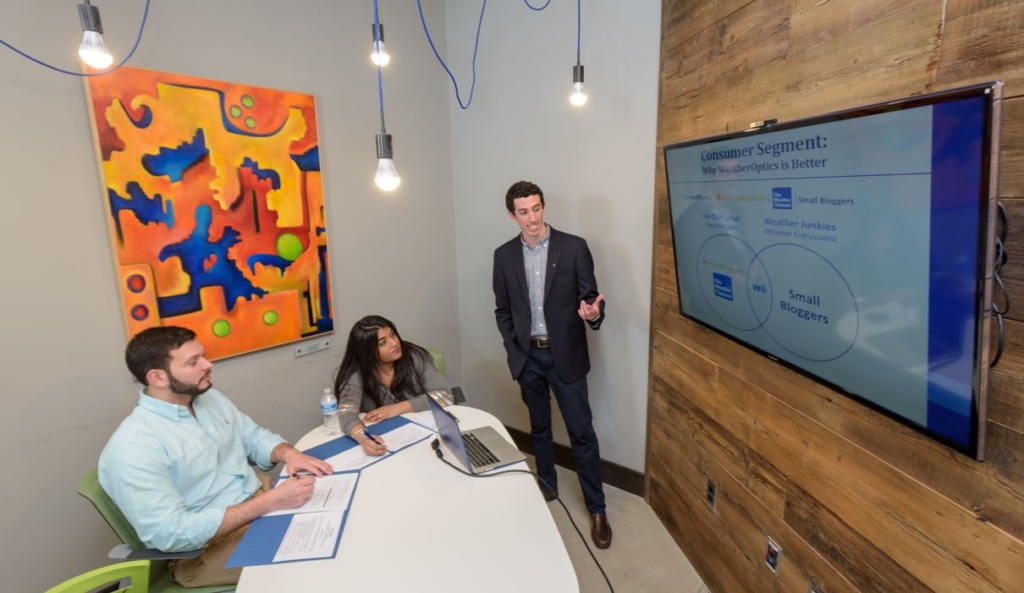
University of Delaware students prepare for the Horn Entrepreneurship Hen Hatch competition in the campus’ Venture Development Center, the entrepreneurial home for the university. (Courtesy photo)
Growing up in Jamaica, Nicholai Lemuel Williamson watched his father start and run the family business, though he didn’t think he wanted to follow in his father’s footsteps at the time. Instead, Williamson had aspirations to become a biomedical engineer because he wanted to help people solve big, real-world problems.

Nicholai Lemuel Williamson
He moved to the U.S. at 16 to attend the University of Delaware (UD), a school ranked among the top 10% in the country for engineering. But, in his initial research, conducted remotely from Jamaica, he learned about UD’s Horn Entrepreneurship program, a university-wide initiative to incorporate entrepreneurial thinking and problem solving within every academic college. His virtual conversations with academic advisors and professors told him that UD in general and Horn in particular cared about students on a personal level, that he wouldn’t get lost in the crowd. He liked Horn’s emphasis on entrepreneurial thinking, and he chose UD largely because of the Horn program.
“I found that I could help people solve problems with entrepreneurship,” Williamson tells Poets&Quants, a Class of 2025 student at Horn who is double majoring in Entrepreneurship and Management.
“Maybe it was me wanting to be more like my dad, but I felt as if entrepreneurship would be my way to solve problems the way people want them solved.”
CREATING VALUE FROM NEW IDEAS
The conversation to build an entrepreneurial program and culture at University of Delaware started about 10 years ago. Dan Freeman, associate professor of marketing at UD’s Lerner College of Business and Economics, agreed to take on the directorship of what was then a new Entrepreneurial Studies program because he felt that higher education wasn’t keeping pace with the speed of innovation in the real-world.
“I really felt like the university was failing its key stakeholders, especially students, by not having good, let alone world-class. opportunities to develop the mindset, skills, and means that you need to create, deliver and capture value for new ideas,” Freeman tells Poets&Quants.
At the time, the directorship meant he was allowed to teach just one less class, and his staff included one half-time grad student. The program had no real budget, no funding, and not much external connectivity, he says.
Fast forward 10 years: Horn Entrepreneurship is hiring its seventh full-time faculty member and has an “army of adjuncts” equivalent to almost 30 FTEs. At any given time, Horn has more than 300 students from all UD colleges engaged in one or more of its programs which includes a cohort based major under the Lerner College of Business, three entrepreneurship minors, seven field-specific certificates, a slew of graduate-level programs, and a number of other programs and initiatives.
UNDER THE RADAR
In 2020, The Princeton Review and Entrepreneur magazine ranked Horn and the University of Delaware No. 38 of the top 50 undergraduate schools for entrepreneurial studies out of more than 500 colleges and universities. For all these reasons, we selected Horn Entrepreneurship for this installment for Under The Radar, a periodic feature series highlighting the hidden gems, the best kept secrets, and innovative programs in undergraduate business education. (Read our first installment, “Inside Darla Moore’s Pipeline To Top Wall Street Firms.”)

Horn Entrepreneurship students work at the Venture Development Center’s Inspiration Wall. (Courtesy photo)
“Horn Entrepreneurship is on its way to putting the best of Silicon Valley in the First State. Its connection to every tech hub in the country through the amazing alumni network is remarkable, and the teaching talent is equally amazing,” says Jason Bangser, who graduated from UD this summer.
“My professors were actual entrepreneurs who are there for no reason other than to help the next generation of founders and ideators succeed. Everyone is personally invested in the success of the people around them, and the mutual synergy is the driving force behind everything the program accomplishes.”
REDEFINING ‘ENTREPRENEURSHIP’
In developing a university-wide culture of entrepreneurship, Freeman vividly remembers meeting with the dean of the College of Arts and Sciences. Why would our students be interested in starting new, small businesses? the dean asked.
“That is a super limited understanding of what entrepreneurship is all about. I think the word ‘entrepreneurship’ was initially a barrier,” Freeman says.

Daniel Freeman
“Entrepreneurship is really about the mindsets, the skill sets, and having the connections and the access to resources to be effective as a creative problem solver. Once he, and others, understood what we really mean by ‘entrepreneurship,’ and not this historical, super limited myopic notion, things started to change.”
The College of Engineering, the premier college on campus and what University of Delaware is widely known for, recognized the value of an entrepreneurial program then housed under a business school after Horn got involved with the the National Science Foundation and joined the National Innovation Network.
The Delaware Innovation Fellows, for example, is open to students from any UD major who demonstrates “passion, creativing, leadership and an entrepreneurial mindset,” according to the programs web page. Fellows are afforded professional development and networking while working with Horn experts and resources to complete an innovation project of their choosing. They earn a certificate aligned with their specific interests whether it be design or food innovation or social enterprise.
“The unique part is it’s this cross-disciplinary, like minded community with access to all of these different opportunities that they might not otherwise ever discover,” Freeman says.
Next Page: Horn’s undergrad entrepreneurship major + Punching above its weight










